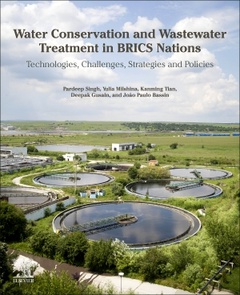Water Conservation and Wastewater Treatment in BRICS Nations Technologies, Challenges, Strategies and Policies
Coordonnateurs : Singh Pardeep, Milshina Yulia, Tian Kangming, Gusain Deepak, Bassin João Paulo

Water Conservation and Wastewater Treatment in BRICS Nations: Technologies, Challenges, Strategies, and Policies addresses issues of water resources?including combined sewer system overflows?assessing effects on water quality standards and protecting surface and sub-surface potable water from the intrusion of saline water due to sea level rise. The book's chapters incorporate both policies and practical aspects and serve as baseline information for future adaption plans in BRICS nations. Users will find detailed important information that is ideal for policymakers, water management specialists, BRICS nation undergraduate or university students, teachers and researchers.
Problem1. Water related problem with special reference to global climate change in BrazilRafael Mendonça Duarte and Adalberto Luis Val2. Water related problem with special reference to global climate change in RussiaGeorge Safonov3. Water related problem with special reference to global climate change in IndiaBinota Thokchom I4. Water Related Problem with Special Reference to Global Climate Change in ChinaChangshuo Huang and Jiahui Tao5. Influence of global climate change on water resources in South Africa: towards an adaptive management approachJoshua N. Edokpayi, Rachel Makungo, Elijah T. Volenzo, Tinyinko Rivers, Mathivha Fhumulani, and John O. Odiyo
Trends and Strategies with Case Study6. Recent trends and research strategies for treatment of water and wastewater in BrazilCesar Rossas Mota Filho7. A water policy outlook for water conservation and wastewater treatment in RussiaLiliana N. Proskuryakova and Sergei Sivaev8. Recent trends and research strategies for treatment of water and wastewater in IndiaNazia Talat9. Recent trends and research strategies for wastewater treatment in ChinaJin Zhang10. Recent trends and national policies for water provision and wastewater treatment in South AfricaJoshua N. Edokpayi, Abimbola M. Enitan-Folami, Adeyemi O. Adeeyo, Olatunde S. Durowoju, Ademola O. Jegede, and John O. Odiyo
Policies and Laws11. Government Initiative and policies on water Conservation and wastewater Treatment in n BrazilDenis Moledo de Souza Abessa12. Government Initiative and policies on water Conservation and wastewater Treatment in RussiaSergei Sivaev13. Government Initiative and policies on water Conservation and wastewater Treatment in IndiaS. Rangabhashiyam14. Government Initiative and policies on water Conservation and wastewater Treatment in China He Fan, Yongnan Zhu and Shan Jiang15. Government Initiative and policies on water Conservation and wastewater Treatment in South Africa Rookmoney Thakur and Ajay Vasudeo Rane
Indigenous Technical Knowledge (ITK)16. Future Perspectives and possible management of water resources in respect to indigenous technical knowledge (ITK) in BrazilJoao Paolo Bassin17. Future Perspectives and possible management of water resources in respect to indigenous technical knowledge (ITK) in RussiaYulia Milshina and Daria Pavlova18. Future Perspectives and possible management of water resources in respect to indigenous technical knowledge (ITK) in IndiaAnwesha Borthakur19. Future Perspectives and possible management of water resources in respect to indigenous technical knowledge (ITK) in ChinaJun Xiang20. Future Perspectives and possible management of water resources in respect to indigenous technical knowledge in South AfricaAjay Vasudeo Rane and Rookmoney Thakur21. Common statements on water resources and Management strategies of BRICS nations' scientists Yulia Milshina
Primary:graduate students majoring in environmental science, environmental engineering and civil engineering.
Secondary: wastewater treatment plant personnel, industrial wastewater treatment professionals, government agency regulators, environmental consultants, and geophysicists
Dr. Milshina is currently working as a Leading expert at National Research University Higher School of Economics in Institute for Statistical Studies and Economics of Knowledge, Moscow, Russia. She has obtained her master degree in economics at Lomonosov Moscow State University, 2013. Her PhD thesis is about Mechanisms for managing public-private partnership projects in conditions of financial and economic instability. She has 10 years of work and research experience in the field of STI and foresight: from business consulting of innovative companies and startups to managing global technology trend monitoring project on University’s level (https://issek.hse.ru/trendletter/). She has published more than 10 research papers (2 of them in Q1 and Q2). Her present research fields are global technology trend monitoring and ecological and climate trends research (including water management and pollution). She is also currently working on Russia Foresight 2030, Moscow innovative project.
Dr Tain is currently working as a Lecturer, Dept. Biological Chemical Engineering, and Tianjin University of Science & Technology, Tianjin, and P. R. China. He has obtained his BS in Biotechnology, Yantai University, Yantai, P. R. China in 2006. His PhD thesis is about Conversion of glycerol to lactic acid with metabolically engineered Escherichia coli. He has 13 years of work and research experience in the field of Biotechnology. He has publ
- Presents tools and techniques that can be used to preserve water resources, including groundwater and surface water
- Provides geophysical methods to quantitatively monitor physical earth processes associated with water resources, such as contaminant transport and ecological and climate change investigations and monitoring
- Includes desalination techniques which can solve the issue of scarce drinking water
Date de parution : 05-2020
Ouvrage de 390 p.
19x23.3 cm
Mots-clés :
access; adaptation; advances; Africa; Amazon basin; aquatic biodiversity; biofilters; blue drop; Brazilian hydrographic basins; Brazilian Policy on Water Resources; challenges; China wastewater; China water resources; China water utilization; climate change; climatic risk; concession; conservation; constructed wetland (CW); cooling water treatment; decentralized wastewater treatment; development and utilization; drinking water; drought; filtration; financial standing; fishing; freshwater; gray water; green drop; hydrological cycle; India; indigenous knowledge; indigenous knowledge (IK); indigenous technical knowledge; indigenous technical knowledge (ITK); industrial activities; Most Stringent Water Resource Management System; poaching; point-of-use water treatment device; public?private partnership; purification; resilience; reuse; river runoff; Russia; safety drinking water; sea hunting; seawater; sensitivity; sewage treatment; sources; South Africa; sustainable development; tariffs; traditional knowledge; vulnerability; vulnerability assessment; wastewater; wastewater management regulation; wastewater reuse; wastewater treatments; water; water and sewage utilities; water conservation; water conservation policies; water management; water management tools; water meters; water policy; water quality; water resource management; water resources; water resources management; water resources security; water scarcity; water sector; water security; water supply and sanitation (WSS); water treatment; water use; water vulnerability; zero liquid discharge (ZLD)



